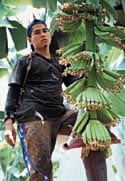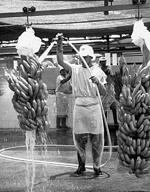Organic bananas and the changing marketplace
by Denny Gibson, PCC Greenlake Produce Journeyman
This article was originally published in September 2002

Of all the fruits and vegetables bought by American consumers, bananas are number one. As an industry, bananas also reflect some issues in the organic movement as a whole. PCC Greenlake Produce Journeyman, Denny Gibson, visited two banana plantations in Ecuador — the world’s largest banana producer — to learn more.
You may have noticed that PCC no longer sells conventional bananas, only organic. That’s a remarkable achievement, considering banana trees bloom and bear fruit only once a year.
However, when many consumers choose a “hand” of bananas, they also want to know, “Where are they from? A big plantation or a small, family-owned plantation? What are the conditions for the workers?” These are some of the concerns that PCC shoppers raise when buying bananas. When my wife and I returned to Ecuador to visit family last fall and toured two banana plantations, these questions were on our minds.
Working with reality
PCC sells organic bananas from many suppliers: Quinta Orgánica (Ecuador), Organics Unlimited (Mexico), Sabrosa (Dominican Republic), Eco Organic (Ecuador, Peru), and Dole (Ecuador, Peru). This provides a steady stream of organic bananas with consistent flavor, texture, stage of ripeness and overall appearance.
Unfortunately, the idea of getting certified organically grown bananas from a family-owned plantation is more of a romantic notion than a picture of reality. Organic bananas produced on small-scale plantations generally are distributed and sold to local and domestic markets. Large-scale organic banana plantations are owned by international companies and produce bananas primarily for export to Canada, Western Europe, and the U.S.
Nonetheless, as a consumer-owned cooperative, PCC asks our producers: Are you dedicated to sustainable, organic farming methods? Are local agricultural inputs (fertilizer, etc.) utilized? Are workers treated fairly? Do you support the organic food industry as a whole? One producer with great answers to these questions is Quinta Orgánica, a smaller, organic producer in the southern coastal region of Ecuador.
Quinta Orgánica: the new standard
When PCC began selling Quinta’s fruit in 2001, customers commented on the superior flavor, creamy texture and consistent appearance. According to Quinta’s founder and CEO, Werner Forster, the difference is due to rich fertile soil, correct balance of organic inputs (such as fertilizer), proper care of the plants, and harvesting the fruit at a slightly later stage of development.
Quinta also is dedicated to sustainable farming methods. Its mission statement reflects a relationship with farmers that’s more like an alliance than as buyer/seller:
“Quinta Orgánica is a health conscious food company … Chief concerns are the health of the land, fruit and people. Quinta Orgánica is 100 percent dedicated to the Organic Lifestyle and continuously seeks to improve the farmers’ competitive position by assisting them with technological input and financial assistance to improve growing and harvesting methods, packing and shipping techniques, and by securing long-term viable markets with education and promotion.”
I’ve corresponded with Werner Forster on a number of occasions, and his central message is the need to understand the reality of the organic food business. It’s extremely difficult, he says, for smaller companies like Quinta Orgánica to compete with the larger, multinational corporations that draw upon vast resources to market their organic products around the world. “It’s like trying to survive amongst a herd of stampeding elephants!”

Is bigger always bad?
Should PCC Natural Markets ever purchase organically grown bananas from multinational companies like Dole? PCC sold Dole’s organic bananas as “fill” about a year-and-a-half ago, when other organic supplies weren’t available, and some members challenged us on it.
Critics argued that Dole’s poor labor and environmental history warrants a ban against ever buying Dole fruit. Other PCC members said dealing with big producers is the trade-off for getting organics into the mainstream; they say that allowing Dole to be a player puts more land into organic production, expands supply and demand, and gives Dole a chance to better its ways.
I’d argue for buying Dole’s organic bananas as “fill” over buying conventional bananas. With conventional, remember that plantation workers are exposed to pesticides in the fields and when washing and packing the bananas. Here at PCC, workers would rather handle organic fruit from Dole than conventional fruit anytime.
My wife Mónica and I also toured the “La Nueva Esperanza” (The New Hope) Dole organic banana plantation in Manabì, Ecuador. Overall, we felt the plantation was well organized, the employees had a clean and safe working environment, and the administrators expressed a commitment to organic farming methods, fair treatment of their employees and protection of the natural environment.
Granted, it was a one-day visit, we’re not soil scientists and we didn’t have a chance to interview the employees. Industry insiders claim Dole executives have said publicly they really “don’t believe” in the organic “fad” and that Dole imports every input possible instead of making it locally, which doesn’t support sustainable agriculture. But what we saw was quite positive compared to what most people might imagine from a multinational corporation.
What this means for many consumers at PCC is that the search for the perfect banana no longer is just about choosing color and size. It’s also about the place it comes from and whether the company is something consumers want to support. Not all organic bananas are created equal. PCC supports the consumer’s right to an informed choice.
Additional information can be obtained at the following website address: http://www.quintaorganica.com/.
